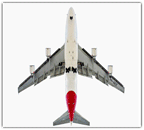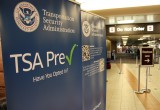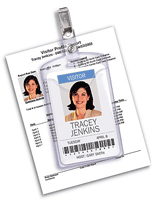06 February, 2008
category: Biometrics, Government, Transit
The American Association of Airport Executives’ (AAAE) Transportation Security Clearinghouse (TSC), the largest civilian clearinghouse in the nation, recently surpassed the 3 million mark for facilitating biometrically based background checks for aviation workers. The TSC is a non-profit arm of AAAE and operates in cooperation with the Transportation Security Administration (TSA) to complete criminal history record checks (CHRCs), such as FBI background vetting checks, for aviation workers. The TSC also operates the interoperable information management system of travelers’ biometric data – the Central Information Management System (CIMS). The CIMS is necessary to ensure interoperability, security and efficiency in the Registered Traveler (RT) program.
AAAE’s Transportation Security Clearinghouse Reaches Milestone for Facilitating Aviation Worker Background Checks
3 million biometric records handled by largest civilian clearinghouse
ALEXANDRIA, Va. – The American Association of Airport Executives’ Transportation Security Clearinghouse (TSC), the largest civilian clearinghouse in the nation, recently surpassed the 3 million mark for facilitating biometrically based background checks for aviation workers. The TSC has also successfully handled more than 1.6 million biographical background checks since its launch in late 2001.
“The Transportation Security Clearinghouse has proven itself remarkably effective in ensuring that workers at the nation’s airports undergo necessary background checks in a manner that avoids unnecessary disruptions to critical airport operations, all while keeping costs to an absolute minimum,” AAAE President Charles Barclay said.
“The TSC has enabled employers at airports to meet their complex employment needs and has ensured that the vigorous and sometimes shifting background check standards established by the federal government can quickly be met for the betterment of airport security.”
The TSC is a non-profit arm of AAAE and operates in cooperation with the Transportation Security Administration (TSA) to ensure criminal history record checks (CHRCs), such as FBI background vetting checks, are accomplished for aviation workers who require access to the secure areas of airports. Operating since November 2001, the TSC has:
- Reduced the average response for aviation worker background checks from 52 days to 4 hours, with many checks occurring in a matter of minutes.
- Reduced the cost (fee) per record for the aviation community twice since its inception – most recently to $27 (of which $17.25 goes to the FBI). By comparison, HAZMAT truckers utilize a system provided by private industry and pay around $100 to accomplish related CHRC checks.
- Implemented the first high-speed, secure network for fingerprint transmissions to the TSA.
- Successfully achieved an industry-low error rate for fingerprint transmissions to the FBI of 2% through value-added processing prior to submission. (The average government error rate is 8%.)
The TSA requires CHRCs for airport employees who access security-sensitive areas of airports, including the secure areas of terminals and the Security Identification Display Area (SIDAs). Biographic checks are required for everyone who requires an airport-issued ID badge at a commercial-service (Part 139) airport.
AAAE launched the TSC to give its members — and all airports — an efficient, cost-effective way to comply with expanding background-check requirements after the Sept. 11, 2001, terrorist attacks.
Airport badging offices collect biometric and biographical information from workers. The data is submitted to the TSC via secure networks established by the clearinghouse. Each data record undergoes a quality check to ensure accuracy and integrity. The TSC then transmits the records to the appropriate government agencies, who conduct the background checks.
The TSC’s role extends beyond acting as the central point for data submission and forwarding the records to the government. The clearinghouse also serves as the central location for airports to retrieve background-check results. On biographic checks, for example, a worker’s status is communicated via a secure Web site established and maintained by the TSC.
Recent fee reductions continue the TSC’s fundamental mission of saving the airport and airline industry both time and money through its commitment to efficiency and technological innovation. The reduction in time, from months to hours, to process CHRC checks in aviation has produced hundreds of millions of dollars in personnel costs savings for an industry struggling to achieve financial success. The TSC has developed a highly flexible, open platform capable of accepting multiple forms of identity and vetting information via secure network from more than 400 badging offices and other enrollment centers around the nation and abroad.
In addition to the aviation worker vetting program, the TSC, in partnership with TSA, also supports background record checks for other key programs, including:
- Background checks and application elements for federal Transportation Security Officer screener candidates;
- General aviation crews operating aircraft with a maximum certificated take-off weight (MTOW) of 12,500 lbs. or more;
- General aviation crews and armed security officers flying into Reagan Washington National Airport;
- Commercial charter pilots;
- Foreign applicants under the Alien Flight School Program and
- Contract screeners at private screener airports.
The TSC also operates the world’s most advanced interoperable information management system of travelers’ biometric data – the Central Information Management System (CIMS). The CIMS is necessary to ensure interoperability, security and efficiency in the Registered Traveler (RT) program. The CIMS is responsible for several key functions, such as processing all records, interfacing with the TSA for background checks, ensuring a chain of trust from vetted enrollments and issued credentials, and sending alerts to all service providers regarding revoked credentials.
For additional information on the TSC, see www.aaae.org/pdf/secpdf/TSCArticle.pdf.
ABOUT AAAE
Founded in 1928, AAAE (www.aaae.org) is the world’s largest professional organization representing the men and women who work at public-use commercial and general aviation airports. AAAE’s 5,000-plus members represent some 850 airports and hundreds of companies and organizations that support the airport industry. Headquartered in Alexandria, Va., AAAE serves its membership through representation in Washington, D.C. and offers unparalleled industry services and professional development opportunities including training, conferences, and a highly respected accreditation program.



